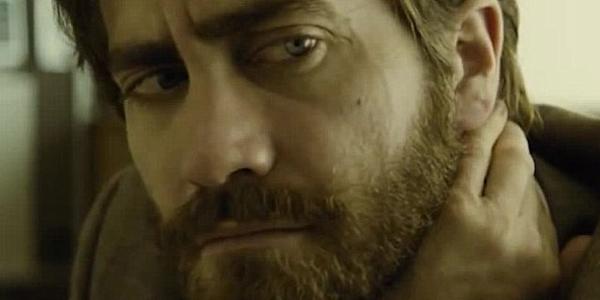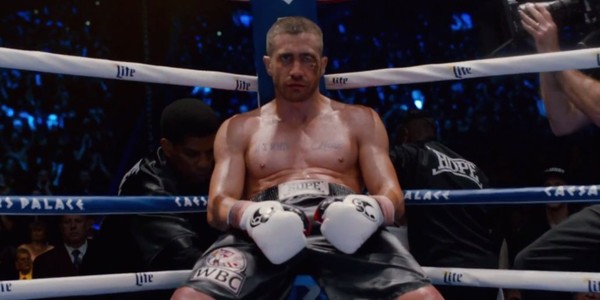SOUTHPAW: As Clichéd As A Sports Movie Can Possibly Be

Alistair is a 25 year old writer based in Cambridge.…
Before it had even stepped into the ring, Southpaw was dead on arrival. After all, although boxing isn’t the sport that has generated the most movies, it is the sport that has generated the most beloved cinematic classics – from Rocky and Raging Bull to the more recent likes of Million Dollar Baby and The Fighter. At the screening I attended, I was far more likely to greet it as an unwelcome entry to the boxing movie pantheon, due to the fact that the last trailer before the movie started was for Creed, the new Rocky spin-off that benefits from having Sylvester Stallone yet again reprising his most iconic role. Seeing that trailer before Southpaw was like being at a restaurant and seeing the table next to you being handed a juicy steak, whilst you look down at your plate and see you’ve been given beans on toast.
Nothing more than a soap-opera about boxing
Instead of a traditional rags-to-riches tale, we are introduced to boxer Billy Hope (Jake Gyllenhaal) at the peak of his powers in the middle of a brutal match at Madison Square Garden, where he eventually gains the title of World Light Heavyweight champion. At a press conference immediately after, c*cky young boxer Miguel Escobar (newcomer Miguel Gomez) demands that Billy challenge him to a match, which doesn’t change Billy’s decision to retire now that he’s at the peak of his powers and can enjoy a comfortable life with his wife (Rachel McAdams) and his young daughter.

After announcing his decision at yet another press conference, the young boxer starts verbally abusing both Billy and his wife – and because this movie is written like a bad soap opera where nobody acts rationally, Billy retaliates. This has fatal consequences that lead Billy on a downward spiral and leave his professional and personal lives in turmoil; if the projector stopped showing the film and you were handed pieces of paper and a pen to write down what you think happens next, there would be absolutely no way you would get it wrong. It has been a while since I’ve seen a film that was this satisfied with doing nothing more than peddling clichés.
This is a movie of two halves, with the first half concentrating more on the soap opera-style narrative of Billy’s life, with performances and characterisations drawn in an artificial way to stop you from ever believing in anything that’s happening on screen. The night after the fatal accident at the press conference, Billy thinks it would be a good idea to travel into the centre of New York to get his revenge on the perpetrator. As a public figure who had boxed at Madison Square Garden only a few days earlier, travelling into the middle of a densely populated city with a weapon is an exceptionally poor idea. Yet the screenplay isn’t written in a way that judges the poor decisions the characters make; it is on par with Prometheus for a film where the characters don’t possess a single shred of common sense due to bad writing and not how they are characterised.

Thankfully I was the only person in the screening, as during the later stages of the film my continued heckling of the screen and questioning the falsely held and unquestioned beliefs of the characters would have gotten me thrown out. Billy’s daughter is the biggest culprit here, written in a way that would make her emotions do a 180-degree spin after every scene for no apparent reason. After being told by a judge he can’t see his daughter for 30 days, she is put under state care (seriously, don’t question the soap opera storyline here), yelling at Billy “are you ever going to let me get out of here?” She then loudly informs him that she hates him and runs off before anybody can explain to her that yes, he is going to get her out of there, in 30 days. Like he literally just explained to her 15 seconds earlier. The movie is most reminiscent of the TV hit Empire, a similarly unbelievable portrait of an entertainment industry that is written as an artificial soap opera yet treated by its creators as the apex of social realism.
The performances compliment the soap opera tone; the fact that the wooden acting style of Curtis “50 Cent” Jackson as Billy’s manager registers as the most grounded performance in the movie should give you an insight to how every performance is pitched. The usually reliable Gyllenhaal here gives one of his worst performances; in one scene he screams and commits a violent rage, the next he mumbles unintelligibly. Instead of finding the middle ground between the two emotions to fully flesh out the character and make him more believable, he just switches them on a scene-by-scene basis, doing whatever the screenplay tells him to do in that scene instead of working out how the character’s behaviour will compliment the movie as a whole.
You won’t forget this movie – because of how much it steals from better ones
In the second half of the movie, Billy has now gone from riches to rags, and it becomes the stereotypical underdog boxing tale. Forest Whittaker is introduced as gym owner “Tick” Willis, the trainer of the only boxer who ever beat Billy. Whittaker’s character is the meeting point of J.K Simmons’ sociopathic band leader in Whiplash and Mr Miyagi in The Karate Kid. It sounds like an original characterisation on paper, yet in practice he delivers the same tough love approach that every boxing trainer utilises in an underdog sports movie. There are no characters in Southpaw; just broad archetypes who happen to have dialogue as well.
As a social experiment, I decided to take a mid-film toilet break (something I never do) in order to see if I could pick up exactly where I left off a couple of minutes later, or if the film decided to do something unexpected that redeems itself from its former unoriginality. Naturally, I was able to pick back up straight away, and as I sat back down, I was treated to that boxing movie staple: the pre-fight training montage. In this half of the film, genre clichés are used to such an extent that is feels not entirely unlike a Zucker-Abrams-Zucker parody of the genre, with Gyllenhaal replacing Leslie Nielsen as the actor who can keep a straight face despite the comic absurdity unfolding all around him.

Despite being an outdated product of a sub-genre that first achieved popularity four decades ago, Southpaw still repeatedly attempts to be cool in order to attract younger, more cynical audiences. The movie was originally set to star Eminem in the lead role, which he wisely decided against, as in many ways the story is identical to 8 Mile, but without the outsider charm. Yet the movie still feels like it should be a vehicle for a hip hop star. The narrative transplants both the highs and lows of the stereotypical rappers’ life story to boxing, whilst the soundtrack repeatedly blares the most inane hip hop songs the producers could find (if you were judging the genre by the music chosen in this film alone, you would conclude it was worthless).
Mostly, the movie feels like what an out-of-touch movie executive thinks “the kids” would find edgy and cool, right from the poorly chosen font of the opening credits to the fact that 50 Cent and Rita Ora both appear, clearly only hired in acting roles under the misguided assumption that they are at the forefront of modern youth culture. Rita Ora’s minute-long appearance, as a drug addled mother of five, is surely only going to register confusion as to why she even bothered appearing in such a thankless role when she has a perfectly successful music career.
Conclusion
Director Antoine Fuqua broke out in 2001 with Training Day, an exceptionally enjoyable action romp that gleefully subverts the expected genre conventions. Since then, he’s had quite a few commercial hits, yet has failed to reignite that same creative spark, instead making movies that are as bland and predictable as their premises suggest. Despite featuring the screenwriting debut of Sons of Anarchy creator Kurt Sutter, taking Damon Lindelof’s crown as the worst transition from show runner to screenwriter, the movie doesn’t have the edge that the pedigree involved in the project would suggest.
It is a boxing movie that fails to pull any punches – less Southpaw, more South Poor. There are moments when Fuqua seems to grasp what has made all the earlier boxing movies so impactful on audiences, with visceral images like a close-up of a blood-covered Gyllenhaal screaming, but he seems too dependant on the soap-opera of the screenplay to follow through in that direction. The movie should be SouthpAwesome. But it is undeniably SouthpAwful.
What are the best and worst boxing movies? Which sport needs an underdog movie of its own?
Southpaw is out in the UK and US now. All other release dates can be found here.
(top image source: The Weinstein Company)
Does content like this matter to you?
Become a Member and support film journalism. Unlock access to all of Film Inquiry`s great articles. Join a community of like-minded readers who are passionate about cinema - get access to our private members Network, give back to independent filmmakers, and more.
Alistair is a 25 year old writer based in Cambridge. He has been writing about film since the start of 2014, and in addition to Film Inquiry, regularly contributes to Gay Essential and The Digital Fix, with additional bylines in Film Stories, the BFI and Vague Visages. Because of his work for Film Inquiry, he is a recognised member of GALECA, the Gay & Lesbian Entertainment Critics' Association.













